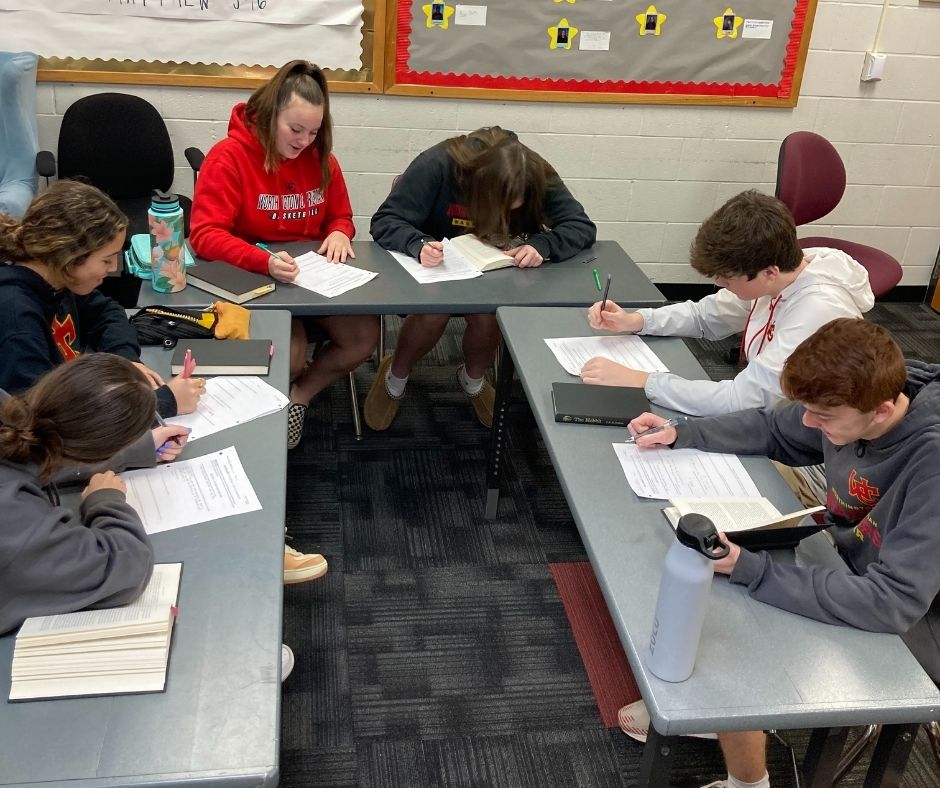WHAT’S THE WORD?

WC students collaborate to create dictionary of current slang terms and lingo
The words of John 1:1 are familiar to many, “In the beginning was the Word, and the Word was with God, and the Word was God.” This verse is widely interpreted as referring to Jesus as the “Word of God.” In the biblical account of God creating the heavens and the earth, Genesis 1:3 says, “And God said, ‘Let there be light,’ and there was light.” God spoke all things into being. Elsewhere in the scriptures, the importance of words is reiterated in terms of keeping an oath, telling the truth, keeping our tongues from evil, and more. It’s safe to assert: words matter to God. As Worthington Christian teachers in all disciplines seek to “develop the mind of Christ in students,” language and words are central to this mission.
As the seventh and eighth grade English teacher at WC, it stands to reason that words are crucial in Emily Solinger’s classroom. In recent weeks, her eighth-grade students have spent time closely examining their words in a unique way.
Solinger’s budding etymologists first took a dive into the histories of the Oxford English Dictionary and Merriam-Webster by reading their origin stories and examining what goes into a dictionary entry. They discussed how dictionaries and their governing organizations are not the sole decision-makers on what gets to be a word or not: they largely track words being created and used by people. They also held discussions around big questions like:
- Who (what groups or individuals) influence and change the English language? How do they do this?
- Why do dictionaries matter? How can they be helpful/useful for English speakers/readers/writers?
- Will the English language ever stop evolving?
- How has the English language changed over time? (consider inventions, geography, humanity, etc)
On the journey to discovering answers to these big questions, Solinger and her students talked through the Bible’s influence on the English language. They read an article entitled “‘Fly in the ointment’? Assessing the influence of the King James Bible (1611)” which highlights how the King James Version of the Bible served to popularize many unique idioms, such that they permeate nearly every area of expression even in modern English.
Language is constantly evolving, and it often happens through the forthcoming generation by way of the technology of the day. In the 1400’s, Gutenberg’s printing press revolutionized language and the public’s access to reading materials. In the last three decades, the internet has similarly revolutionized access to information and is also instrumental in the evolution of the English language. The notion of new words or phrases–or at least new uses for existing terms–is a familiar one for tweens and teens. Solinger explains, “I frequently hear students throwing out words that are unfamiliar to me.” As a way of applying their learning, Solinger’s students created a “WC English 8 Slang Dictionary.” Contributions to this dictionary were developed individually by the students–each crafting their own entry. In so doing, they demonstrated familiarity with the components of a dictionary entry and were actively participating in the evolution of the English language.
Each of the words submitted to the slang dictionary is undoubtedly well-known among tweens and teens, but that may not be true for their parents or those outside of the younger generation. Some words may be recognizable to adults–words like “cracked” and “slaps”–but they have completely different meanings and uses nowadays. Other words may be wholly novel and unknown–words like “bussin,'” “cap,” and “abow.” Solinger and her students shared some of their etymological knowledge on WC’s blog for parents, “Navigating Your Child’s Education.” To see the list of current slang terms, along with their student-created dictionary entries, make sure to check out the full blog post entitled “Speaking the Same (S)Language.”
